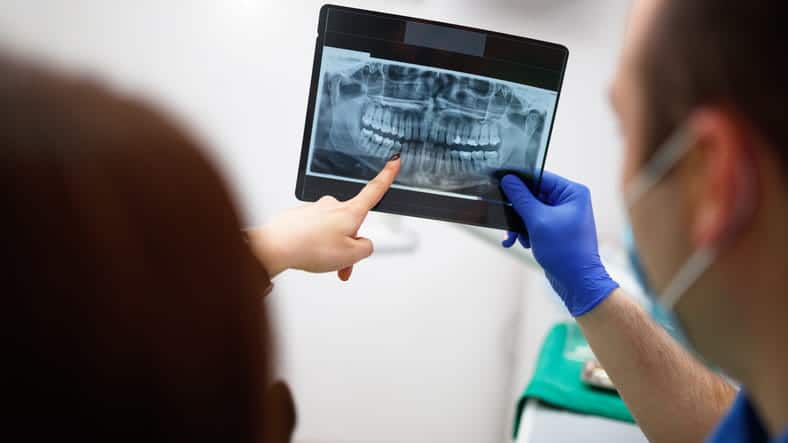Reasons For Tooth Extractions
There are many reasons for tooth extraction, including the following:
- Advanced tooth decay: When tooth decay damages the inner parts of a tooth, it causes painful infections that can spread. Removing the tooth may be the best option.
- Impacted wisdom teeth: When a wisdom tooth does not have enough room to grow, it can become stuck below the gum line or only partially erupt. This leads to an impacted tooth.
- Severe gum disease: Diseased gum tissue may not support healthy teeth. This gum deterioration may require a tooth extraction.
- Broken or fractured tooth: If a tooth is cracked or broken, it may be beyond saving and will need to come out
- Dental trauma or injury: A sudden impact to the mouth can cause irreparable damage to a tooth or bone tissue. In these cases, your dentist may suggest extraction.
- Orthodontic treatment: When teeth are overcrowded, an orthodontist may remove a tooth or teeth to make room for treatment
What Happens During A Tooth Extraction?
While every patient is different, a tooth extraction generally follows the same steps, from surgical preparation through tooth extraction recovery.
Preparation For Extraction
Before a surgical extraction, the team will take X-rays and conduct a full exam to determine the extent of the damage. They will also go over your medical history and walk you through what to expect.
You may be instructed to refrain from eating for several hours prior to surgery. On the day of the tooth extraction, you will be sedated to ensure you’re pain-free throughout the procedure.
The Extraction Procedure
After you’re sedated, the oral surgeon will make a small incision in the gums to expose the tooth. Extracting the tooth may involve breaking it into smaller sections to make removal easier and less invasive. Depending on the complexity of the procedure, the surgeon may also remove some of the surrounding bone or damaged tissue.
After the tooth is pulled, the team will thoroughly clean the socket and smooth out the remaining bone. They may also close the extraction site with dissolving stitches. As you recover from sedation, you will need to bite down on gauze to help stop any bleeding.
Tooth Extraction Recovery
Healing time after a tooth extraction will vary from patient to patient. Some people may experience some discomfort and swelling after the procedure and will take longer to get back to their usual routine. However, your dentist will provide detailed instructions on how to care for the extraction site and promote healing. Follow these directions carefully to optimize your recovery time.
We Accept Most Dental Insurance
Absolute Dental is a preferred provider for most insurances, unions, and hotels that include: Aetna, Ameritas, Boon-Chapman, Caesars Palace, Cigna, Delta Dental, Diversified, Geha, Guardian, Harrah’s, HealthSCOPE Benefits, Health Plan of Nevada (HPN), Humana, Liberty, Met-Life, MGM-MIRAGE, Premier Access, The Standard, Station Casinos, Teachers Health Trust, United Concordia, United Healthcare, Venetian, and The Zenith. We also accept Medicaid.
If you do not see your dental insurance listed here, just give us a call to confirm!
Every person’s situation is different. If you don’t see your health insurance here, or if you do not have dental insurance, we can help you!
Call us now to discuss your situation and discover what options are right for you.
Special Considerations With Surgical Tooth Extractions
As with any type of surgery, there are some things to consider before surgical tooth extraction.
Possible Risks
While rare, there are some risks that come with a tooth extraction procedure, including:
- Dry socket
- Nerve damage
- Damage to other teeth
- Swelling at the extraction site
- Reactions to sedation
Cost And Insurance Coverage
You may want to ask your dentist about the cost of tooth extractions and if your dental insurance covers it. If you don’t have insurance, Absolute Dental offers special discounts and flexible payment options.
Neighborhoods We Serve in Las Vegas
At Absolute Dental, we’re proud to provide comprehensive dental care to families across Las Vegas. Whether you’re in need of teeth cleaning, cosmetic dentistry, braces, or pediatric dental care, we’ve got you covered. From general care to emergency dental services, we’re here to help you and your loved ones maintain healthy, beautiful smiles, with convenient locations in your neighborhood.
Our Neighborhood Locations:
Affordable Oral Surgery At Absolute Dental
With multiple locations throughout Las Vegas, quality dental care is never far away. Contact us to learn more about our oral surgery services and special offers on tooth extractions in Las Vegas.




















